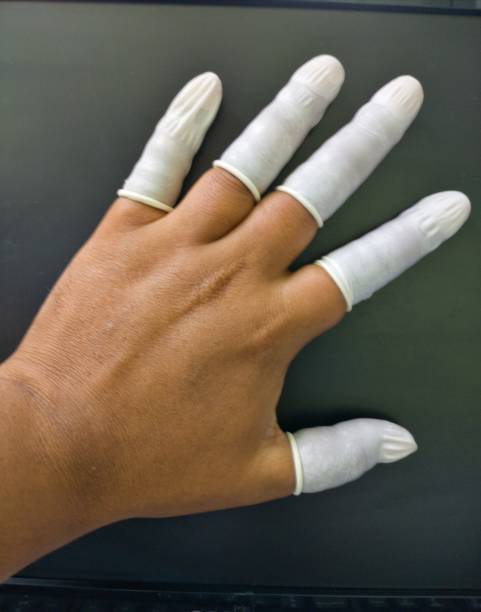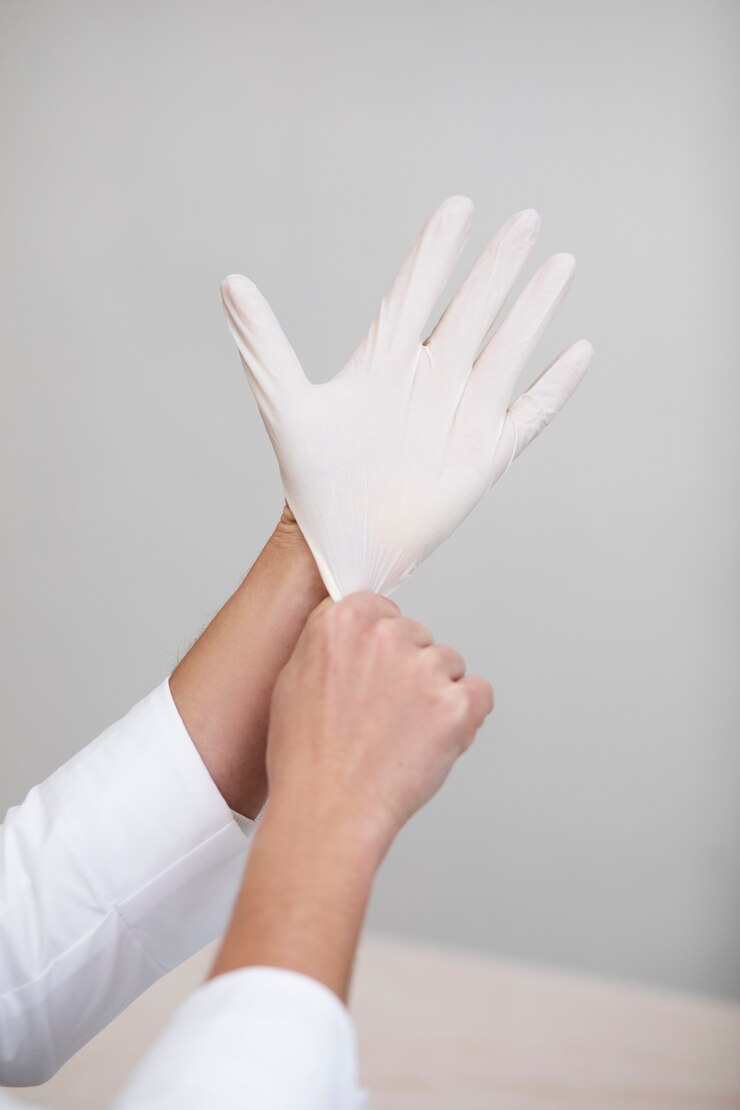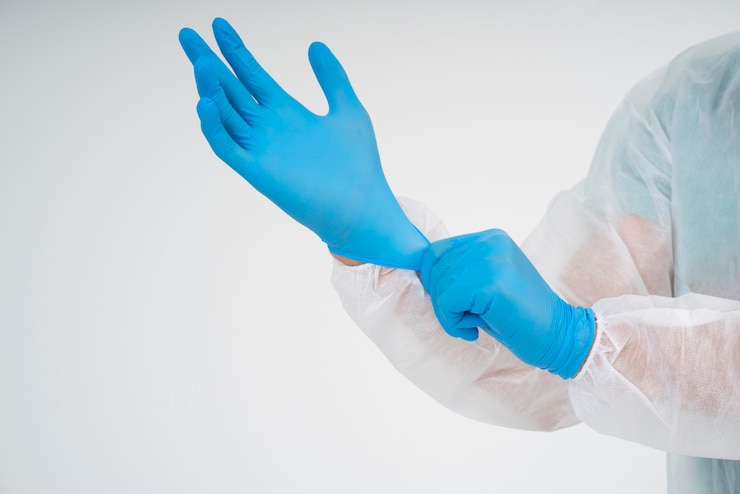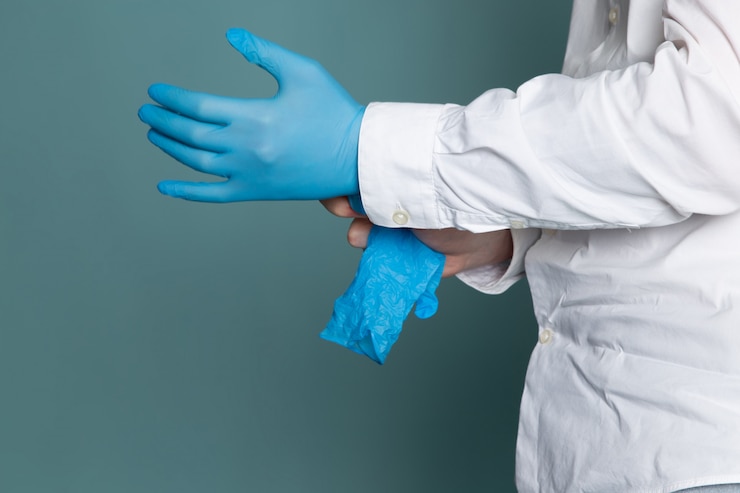In many workplaces and homes, gloves play an important role in keeping hands safe. From hospitals and clinics to workshops and kitchens, they help protect against chemicals, germs, and other harmful substances. Among the different options available, nitrile gloves stand out as a reliable and safe choice. Made from synthetic rubber, they are latex-free, durable, and resistant to punctures and many chemicals.
According to the U.S. Food & Drug Administration (FDA), nitrile gloves offer excellent barrier protection, which is why they are widely used in medical and industrial settings. Let’s explore the different types, practical uses, and key benefits that help you choose the right pair for your work or everyday tasks.
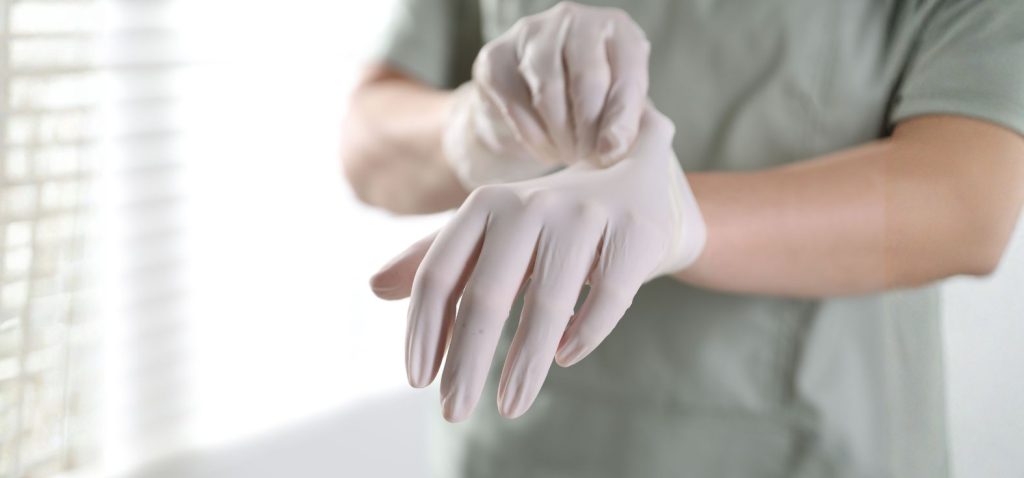
What Are Nitrile Gloves?
Nitrile gloves are protective gloves made from a type of synthetic rubber called nitrile. Unlike latex gloves, they don’t come from natural rubber, so they’re safe for people with latex allergies. These blue gloves are strong, flexible, and give a good fit, making it easy for you to work without losing grip or comfort.
They are also resistant to many chemicals, oils, and punctures, which makes them a good choice for both medical and industrial use. Whether you’re working in a hospital, a workshop, or at home, nitrile gloves help keep your hands clean and protected.
Nitrile vs Latex Gloves vs Vinyl Gloves: A Quick Comparison
| Feature | Nitrile Gloves | Latex Gloves | Vinyl Gloves |
| Material | Synthetic rubber | Natural rubber | PVC (plastic) |
| Allergy Risk | No latex, safe for sensitive skin | Can cause latex allergies | No latex, low allergy risk |
| Strength | Very strong and tear-resistant | Strong but can break with chemicals | Weak, can tear easily |
| Chemical Resistance | High protection | Moderate protection | Low protection |
| Fit & Comfort | Snug fit, flexible | Very comfortable and stretchy | Loose fit, less flexible |
| Best For | Medical, industry, cleaning, and food use | Medical, lab work | Short tasks, food service |
| Cost | Medium | Medium to high | low |
Which One Is Best for Different Needs?
1. Nitrile Gloves:
- Best for medical use, cleaning, food handling, and industrial work.
- Strong, durable, and safe for people with latex allergies.
- Good chemical resistance and long-lasting protection.
2. Latex Gloves:
- Ideal for medical exams and lab work.
- Very comfortable and gives a natural fit.
- Not suitable if you or others have latex allergies.
3. Vinyl Gloves:
- Good for short, light tasks like food service or basic cleaning.
- Budget-friendly option.
- Less protection and is not suitable for heavy or chemical-related work.
Types of Nitrile Gloves
Nitrile gloves come in different types to match different jobs. Knowing the types will help you pick the right gloves that work best for your tasks. Here are the main types explained in simple words:
Powdered Nitrile Gloves:
- These disposable gloves have a light powder inside, which makes them easier to put on and take off.
- They’re useful if you need to wear gloves for a long time and want less sweating.
- However, the powder can sometimes cause skin irritation or make a mess.
Powder-Free Nitrile Gloves:
- These gloves don’t have any powder, so they’re cleaner and safer for sensitive skin.
- They’re the best choice for medical, food, or clean work areas.
- You get the same strong protection without worrying about powder.
Medical Grade Nitrile Gloves:
- Made for hospitals, clinics, and other healthcare settings.
- Nitrile gloves for healthcare go through strict quality checks to keep you and your patients safe.
- Perfect for anyone working in healthcare or tasks that need extra hygiene.
Industrial Grade Nitrile Gloves:
- These are thicker and tougher.
- They give you extra protection against chemicals, oils, and rough materials.
- Great for mechanics, cleaners, and anyone doing heavy-duty work.
Black Nitrile Gloves
- These gloves are strong and stylish, often used by tattoo artists, mechanics, and beauty professionals.
- The dark color hides stains, giving a clean and professional look.
- They offer the same protection and comfort as regular nitrile gloves.
Top Uses of Nitrile Gloves Across Industries
Nitrile gloves are widely used in many industries because they protect your hands and keep your work safe and clean. Their durability, flexibility, and chemical resistance make them the preferred choice for professionals and everyday users alike. Here are the main ways you can use them:
Healthcare & Medical:
- Doctors, nurses, and laboratory staff rely on these blue gloves to stay safe from germs, bacteria, and chemicals.
- They help protect your hands while also keeping patients safe, reducing the risk of infections.
- They are strong enough to handle medical tools without tearing, which makes your work easier and safer.
Food Handling & Hospitality:
- If you work with food, using it ensures your hands stay clean and prevents germs from spreading to food or customers.
- They are safe for handling all types of food, including raw meat and fresh produce, without causing allergies.
- Nitrile gloves are more durable than vinyl gloves, so they last longer during busy kitchen work.
Industrial & Workshop Work:
- Mechanics, factory workers, and cleaners use these gloves to protect their hands from oils, chemicals, and rough materials.
- They are strong, puncture-resistant, and provide a secure grip, which makes your work safer and more comfortable.
- Whether you are fixing machines or handling chemicals, these gloves give you confidence that your hands are protected.
Tattoo & Beauty Industry:
- Tattoo artists, hairdressers, and beauty professionals use black nitrile gloves to keep their hands clean and their work looking professional.
- These gloves hide stains and ink, while still offering the same protection and flexibility as standard gloves.
- Using them in beauty work ensures you can focus on your clients without worrying about hygiene or skin contact.
Household Cleaning:
- These disposable gloves are perfect for cleaning at home because they protect your hands from harsh detergents, chemicals, and germs.
- They prevent skin irritation and keep your hands dry and safe while you scrub, wash, or disinfect.
- Using gloves makes your household work easier and more hygienic, so you can complete chores without damaging your skin.
Benefits of Using Nitrile Gloves
Nitrile gloves are beneficial for keeping your hands safe and clean in many jobs. You can use them in hospitals, workshops, kitchens, or even at home. Moreover, the best nitrile gloves protect your hands from dirt, germs, chemicals, and injuries, while also making your work easier and more comfortable.
1. Safe for Allergies: The best thing about nitrile gloves is that they don’t have latex in them, so if you’re allergic, you’re good to go. No more worrying about getting rashes or irritated skin when you put them on.
2. Strong and Durable: These gloves are tough and won’t rip on you. You can handle sharp stuff or rough things without worry, and they last a long time before you need new ones.
3. Chemical Protection: They keep oils, cleaning stuff, and nasty chemicals off your skin. That’s why hospitals, factories, and people cleaning their homes like them so much.
4. Comfort and Fit: They feel good on your hands and move with you naturally. You can wear them all day without getting annoyed, and you can actually do your job properly.
5. Hygiene and Cleanliness: They keep germs from getting around and help you stay clean. If you’re handling food, working in a hospital, or just doing chores at home, they’re perfect.
6. Professional Look: Black or colored nitrile gloves just look clean and professional. Tattoo artists, car mechanics, and beauty people love them because they hide stains and look good.
How to Choose the Right Nitrile Gloves for Your Needs
Getting the right nitrile gloves matters a lot. You want your hands to be safe, clean, and comfortable. What you pick depends on what kind of work you do, how long you wear them for, and how much protection you actually need. If you grab the wrong ones, your job gets harder, or your hands could be at risk. Knowing what to look for will help you decide.
1. Consider the Application: Think about what you’re gonna use them for first. Working in a hospital or doctor’s office means you need medical-grade gloves that keep germs away. If you’re cleaning or working with chemicals, you need tough ones that can handle the job. Food handling requires gloves that are safe for food and stop germs from spreading. Just match what you pick to what you’re actually doing.
2. Size and Fit: Getting the size right makes a huge difference in how they work. Too tight and your hands get sweaty and uncomfortable, too loose and they slip around, which makes it hard to grab things safely. You want your fingers to move freely and be able to grip stuff without losing your grip. Good-fitting gloves also mean you can wear them longer without getting annoyed.
3. Thickness and Strength: How thick the gloves are changes how much they protect you and how flexible they are. Go thicker if you’re doing heavy work and need protection from chemicals, punctures, or rough stuff. Thinner gloves are better when you need to feel what you’re doing, like medical exams or detailed work. Balance what you need between staying safe and being able to feel things.
4. Powdered or Powder-Free: Powdered gloves go on and come off more easily, especially if you use them a bunch. But powder-free gloves are cleaner and better for sensitive skin, handling food, or healthcare work. Pick whichever works better for you and what your job needs.
5. Colour and Style: Sometimes the colour matters, depending on the job. Black or darker gloves get picked by tattoo artists, mechanics, or beauty workers because stains don’t show, and they look professional. Lighter colours get used more in hospitals or food places where you wanna see if things are clean.
6. Check for Standards and Certification: Make sure you look for gloves that have passed safety tests and are certified for your kind of work. Certified nitrile gloves for healthcare have been tested and checked, so you know your hands are really protected from stuff that could hurt you or give you germs. This is especially important for healthcare, lab work, or industrial use.
Shop Nitrile Gloves now at Livingstone International
Choosing the right nitrile gloves is essential for protecting your hands and ensuring safety in your work. Whether you’re in healthcare, food service, cleaning, or any other field, the right gloves can make a significant difference.
If you’re looking for reliable, high-quality gloves, consider exploring the range offered by Livingstone International. As an Australian-owned company with over 40 years of experience, Livingstone International provides a wide selection of gloves that meet Australian, European, and American standards. Our products are trusted by businesses, workplaces, households, and government sectors across Australia.
Visit our website to find the perfect gloves for your needs and enjoy the peace of mind that comes with quality protection.
Faqs
1. What are nitrile gloves made of?
Nitrile gloves are made from synthetic rubber. They are strong, flexible, and safe for people who have latex allergies.
2. Can I use these gloves for food handling?
Yes, you can. These gloves help keep your hands clean and stop germs from spreading to your food.
3. Are nitrile gloves safe for people with latex allergies?
Yes, they are completely latex-free, so you don’t have to worry about skin irritation or allergic reactions.
4. How long can I wear nitrile gloves?
You can wear them for a few hours, but it’s best to change them if they get dirty or start to tear.
5. What is the difference between powder-free and powdered gloves?
Powdered gloves are easier to put on, but powder-free gloves are cleaner and better for sensitive skin or medical tasks.
6. Can I use nitrile gloves for cleaning and chemicals?
Yes, they protect your hands from many chemicals, oils, and cleaning agents, keeping your hands safe while you work.
7. Are nitrile gloves reusable?
Nitrile gloves are usually meant for single use. Using them again can reduce protection and increase the risk of germs or chemicals reaching your hands.
8. Do black nitrile gloves offer the same protection as blue or white gloves?
Yes, the colour doesn’t affect protection. Mechanics or tattoo artists often choose black gloves because they hide stains.
9. How do I know the right size for nitrile gloves?
Measure your hand around the widest part of your palm. Gloves that fit snugly give better control and comfort while working.
10. Where can I buy high-quality nitrile gloves?
You can get trusted, high-quality gloves from Livingstone International, which offers a wide range for medical, industrial, and everyday use.

